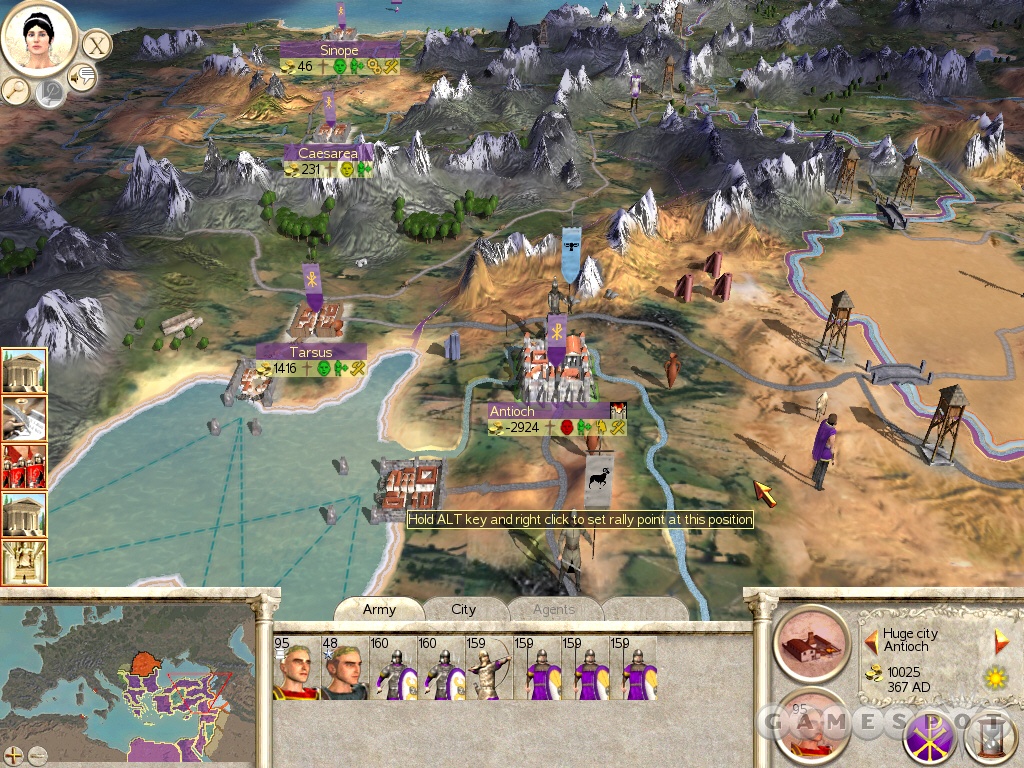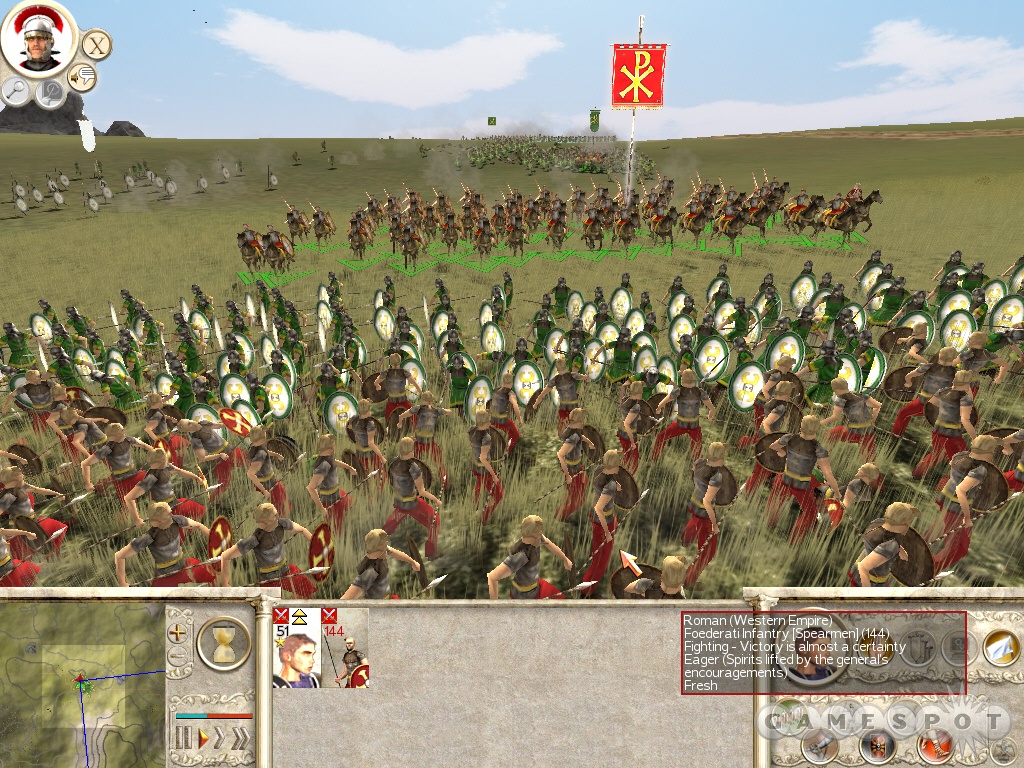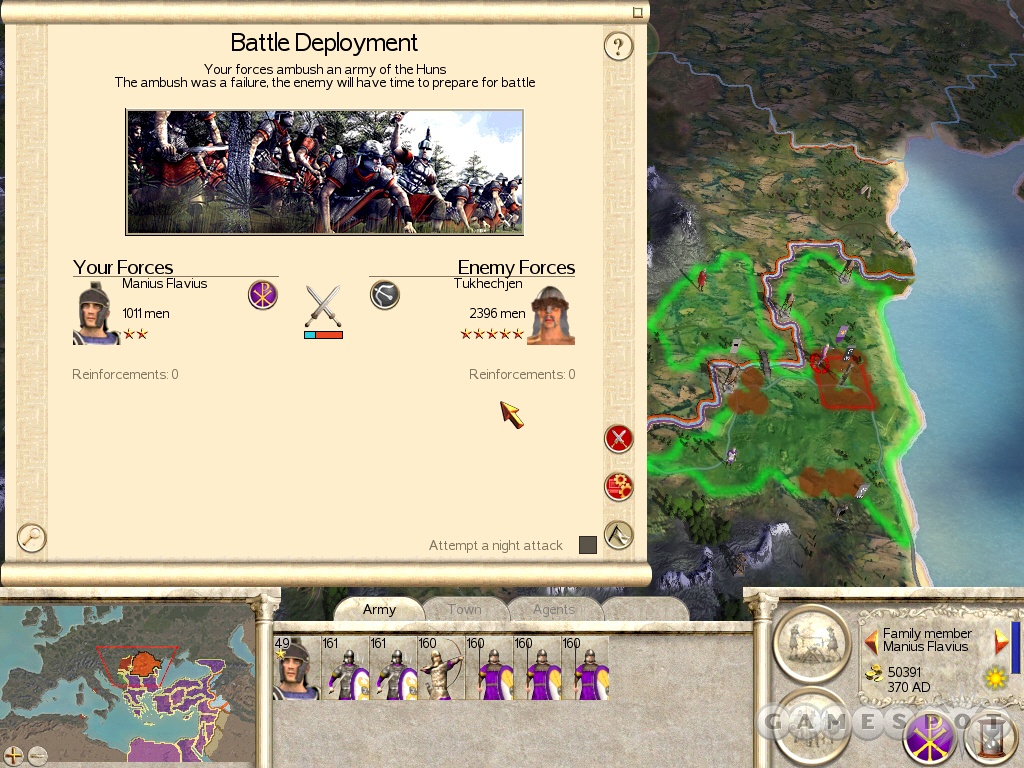If you managed to create a mighty ancient empire in Rome: Total War and you're looking for the next big challenge, then Rome: Total War Barbarian Invasion should fit the bill. The expansion to last year's hit strategy game, Barbarian Invasion ups the challenge considerably from the original game. And you'll discover that the decline and fall of Rome is much tougher than its rise ever was.

Barbarian Invasion introduces a ton of new content to the core game, as well as countless improvements. The expansion begins several hundred years after the campaign in Rome: Total War. The Roman Empire has become so large and unwieldy that it has split apart into eastern and western halves. Meanwhile, barbarian tribes and migrations of powerful newcomers introduce challengers to Rome's supremacy. You can play as either Roman faction, and you also can play as the barbarians themselves. The good news here is that you don't have to "unlock" them first by winning as a Roman faction, like you had to in the first game; these barbarians are playable from the get-go.
Pretty much any faction you choose will immediately highlight the main difference between Barbarian and the original game, though. Barbarian Invasion is a much more challenging game, partly because every faction starts out at some kind of disadvantage, and partly due to the improvements in the artificial intelligence. For example, if you select any of the barbarian tribes, such as the Saxons or the Franks, you'll quickly discover that you start with a very small amount of territory, and you're surrounded by lots of potentially hostile neighbors. Meanwhile, things aren't much easier for the two Roman factions, as Western Rome has a huge, vulnerable empire that's in decline, which makes it hard to defend. Eastern Rome, on the other hand, starts off on a much stronger position, but it'll need every resource at its disposal to fend off challenges from mighty rivals, such as the Sassanids and the dreaded Huns.
In order to carve out an empire in Barbarian Invasion, you're going to need to balance diplomacy and war to a greater extent than you did in the first game. That's because strategic-level artificial intelligence has improved considerably from the first game. Neighbors won't hesitate to stab you in the back if they see an opening, even if you're supposedly "friends." And when war happens, the AI no longer sends armies at you piecemeal. Instead, it amasses huge armies and sends them at you like some gigantic horde. Even on the "easy" difficulty level, the AI is relentless. For example, it will keep the pressure on a besieged city constantly, forcing you to send a relief force to lift the siege.

You can also win and lose cities through revolts. If a populace is unhappy, it may decide it's time to switch sides or simply rebel. Though you can manage the populace by constructing various buildings or lowering the tax rate, one of the new features in Barbarian Invasion deals with managing religion, which was an element that was somewhat missing in the first game. By the era of Barbarian Invasion, Christianity, Zoroastrianism, and paganism all vie for followers. Religion is now a tool by which you can keep your people happy by constructing shrines to their faith. It can also cause problems for your side, as well. For example, if you capture a city with a different religion, you may cause unrest, especially if the official state religion and the religion of the people are different.
There are many welcome improvements in the strategic portion of Barbarian Invasion, particularly with the AI, which was always a bit too scatterbrained in the original game. That said, the naval combat in the expansion still feels a bit random; you can wage battle after battle and hardly ever see ships sink. Also, one perennial complaint still remains: When you queue up production for a city, the game immediately charges you for every building you add to the queue, even though actual production of many of those buildings won't begin for many turns. In other words, you're charged when you order the building, not when production of the building actually begins. This raises the micromanagement level a fair amount, since you might need to revisit cities constantly to add new production orders.
The real-time combat portion of Barbarian Invasion picks up nicely from the original, and, once again, you can lead huge armies in glorious 3D battle. There are some new formations and battlefield abilities at your disposal, such as the ability to have light infantry swim across a river. The biggest new battlefield feature, though, are night battles, and these are nice from both an aesthetic and strategic aspect. Night battles look spectacular, and you see the flickering torchlight illuminate your formations in the dark. You can also use night battles to divide up a superior force, as armies with generals who lack the night-attack ability can't reinforce one another at night like they normally do during the day.

Barbarian Invasion only ships with two historical battles, but the value of this expansion is in the overall improvements it makes to the core game, as well as the sheer challenge of the new single-player campaign. In many ways, Barbarian Invasion feels like a graduate course in Rome: Total War, and it'll appeal mainly to Rome fans looking for a fresh new challenge. Meanwhile, newcomers to Rome should familiarize themselves with the original game first, before tackling the barbarian horde.



